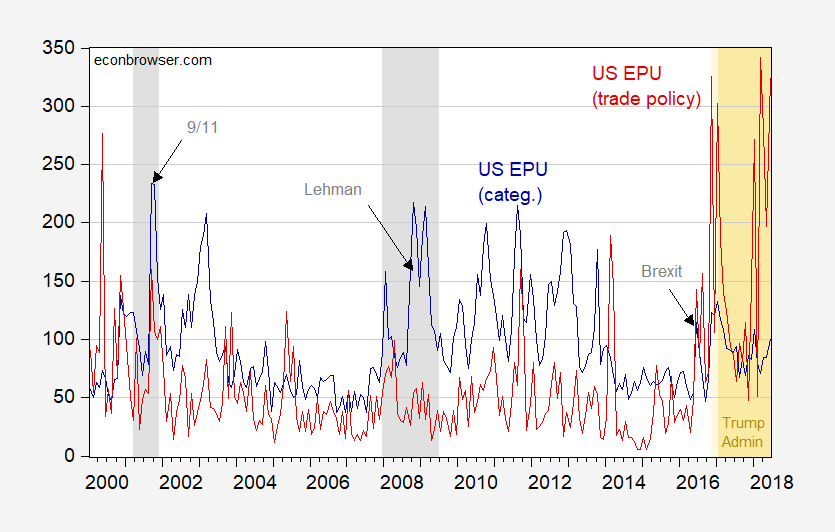Just in case you were wondering.

Figure 1: US Economic Policy Uncertainty (blue), and Trade Policy component (dark red), normalize to geometric mean 1985-2010=100. Source: PolicyUncertainty.com, categorical page
Where are all the people who decried policy uncertainty during the 2009-2016 years?
But, but, but…you didn’t do it in logs!!!
https://www.sovereignman.com/trends/governments-already-dismal-budget-forecast-just-got-106-worse-23986/
categ.?
Erik Poole: Categorical EPU indices, as opposed to standard. The normalization is different. The soruce link goes to the relevant webpage.
I downloaded the spreadsheet. There are 10 categories. Which category?
Erik Poole: Column 1, listed as “Economic Policy Uncertainty” is plotted as blue line, and Column 9, listed as “Trade Policy” is plotted as red line… just as indicated in legend to the figure.
Steven Kopits, surely those awful deficit numbers couldn’t have come out of the White House, could they? Mike Mulvaney must have been thwarted by the accounting traitors in Deep State.
Actually those deficits should be good news for Republicans as they argue for cuts to Medicare and Social Security. Their strategy has always been tax cuts for the rich (which pay for themselves!!) to bankrupt the country and used as an excuse to cut entitlements.
Republicans have never given a damn about deficits.
Got it. Category 1.
Thanks for the patience, apologies for the thickheadedness (which may not be a word but should be).
Joseph wrote: “Republicans have never given a damn about deficits.”
Curious. One might expect conservative formations in Canada to be more fiscally conservative than other formations to the so-called left (whatever that exactly means).
Out-of-the-window: Canadian conservative, so-called right-of-centre parties used to favour fiscally conservative policies but in recent decades not so much.
They do care about appearances though. So we get budgetary games or we get annual balanced budget rhetoric presumably because the electorate is not very well informed. Or we get unapologetic deficits. Critics will mention the same ‘starve the beast’ strategy that President Ronald Reagan was alleged to have used to keep the overall size of government down.
I suspect that the lure of special interest politics is simply too strong and somehow those parties to ‘the left’ are slightly better immunized against special interest groups. In addition, there is the notion that fiscally conservative policies would seemingly buttress a more generous and larger welfare state.
All those thoughts aside, it is great to see so many partisan elements come together to fight the Trumpette trade war. President la Trumpette is the great unifier.
Thank you Donald Trump for bringing so many Canadians together. Sir, you are the best thing for Canadian unity that has happened in a very long time.
I just learned something interesting. Those “Make America Great Again” hats are manufactured in China.
Question – is Trump imposing a tariffs on his own stupid hats?
To my mind, this is a very big deal and signals the end of the Castro era in Cuba.
https://ca.news.yahoo.com/cubas-president-names-cabinet-resembling-castros-161410089.html
Since you brought it (the end of the Castro era) up, I’m reminded of the beginning of said era. specifically the great scene in Godfather II where the dictator Bastista is introducing all of Cuba’s business partners, including Miguel l Corleone, representing the gaming and tourism industry.”(The presentation of the gold telephone by AT&T was a particularly nice touch).
Sadly, Batista, realizing he’s about to over run by the rebels, announces he’s leaving because, “Mi posicion es unsustenable.” Not, however, so unsustenable, that he and the family didn’t escape without plenty of loot.
Let’s hope the next Cuba can do better than plundering or blundering dictators.
But wasn’t Trump cracking down on Obama overtures to opening up Cuba? Forma America Grande, Otra Vez! Con gorros (o sombreros) compra via TRUMP!
Viva Cuba! Viva Los Estados Unididos!
Yes, the switch in emphasis is a big deal. Too bad US sanctions helped to delay that change by half a century.
I guess Americans have little confidence in freemarket capitalism. That would explain why they voted in the Mango Mussolini President with all his deeply insight into markets being zero-sum resource allocation mechanisms.